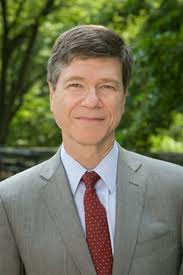Can the problems of extreme poverty
be fixed? Is there a counter response
to poverty traps?
Jeffrey Sachs represents one school of thought that suggests
big ideas and more aid is needed to implement a “big push”
to move poor nations out of their economic slump. William Easterly represents another school of
thought that suggests Sachs is absolutely wrong and history proves it. The use of microfinance and microfranchising
has been making a positive impact in helping people to help themselves out of
extreme poverty. A third alternative
incorporates the best of both schools of thought.
 |
| Jeffrey Sachs |
Sachs’ solutions for reducing by
half the number of people in extreme poverty by MDG1 date of 2015 and eradicating
extreme poverty by 2025 is both big and bold thinking. When Sachs shares his ideas, he is accused of
“shock therapy” to capture his audience’s attention. [William
Easterly, “A Modest Proposal,” Washington Post, March 13, 2005.] For example Sachs laments that, “Currently,
more than eight million people around the world die each year because they are
too poor to stay alive. Our generation
can choose to end that poverty by the year 2025” [The End of Poverty 1].
In his recent book, Common
Wealth: Economics for a Crowded Planet, Sachs declares, “The world can
certainly save itself, but only if we recognize accurately the dangers that
humanity confronts together…. The world’s current ecological, demographic, and
economic trajectory is unsustainable, meaning that if we continue with
‘business as usual’ we will hit social and ecological crises with calamitous
results.”
Sachs
has also outlined sweeping strategies to fix the world’s environment, stabilize
world population at eight billion, end extreme poverty by 2025, and create
global problem solving and cooperation.
No doubt knowing he would be criticized for such grandiose ideas, he
says, “Attaining these goals on a global scale may seem impossible…. The
barriers are in our limited capacity to cooperate, not in our stars” [Common
Wealth, 7].
Sachs believes rich nations like
the United States
have been stingy in the past and need to give more aid to developing
countries. If developed nations would
simply give what they committed, the MDGs could be reached. He reminds the world that, “… the task can be
achieved within the limits that the rich world has already committed: 0.7
percent of the gross national product of the high-income world, a mere 7 cents
out of every $10 in income” [The End of
Poverty. 288].
Not everyone agrees with Sach’s
proposals. William Easterly, who
strongly opposes Sach’s ideas to end extreme poverty, will be considered in the
next post.